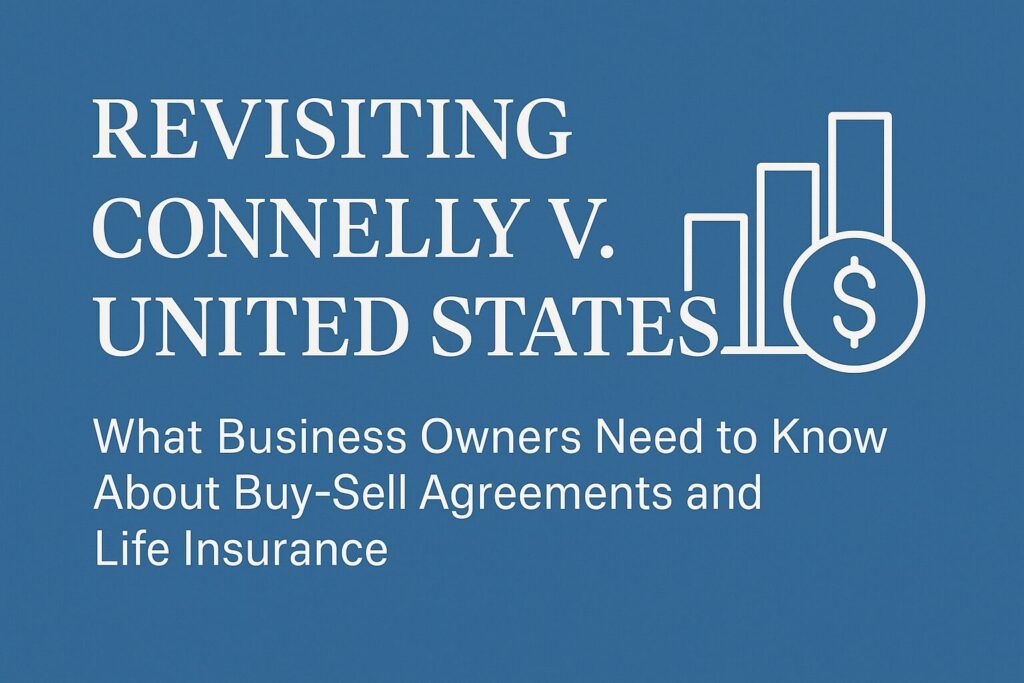Revisiting Connelly v. United States: What Business Owners Need to Know About Buy-Sell Agreements and Life Insurance
Date: 09/17/2025
Author: Prime Law Group

When the U.S. Supreme Court issued its opinion in Connelly v. United States, 602 U.S. ___ (2024), it quietly reshaped how estate planners, business owners, and tax professionals must think about buy-sell agreements and corporate-owned life insurance. The case centered on whether life insurance proceeds held by a corporation—and earmarked to redeem a deceased shareholder’s stock—should increase the value of that shareholder’s estate for federal estate tax purposes.
The Facts in Brief
The Connelly brothers were the only shareholders of Crown C Supply, Inc. Michael owned about 77%, Thomas owned about 23%. Their buy-sell agreement provided that if one died, the survivor could buy the other’s shares. If the survivor declined, the corporation itself was required to redeem the shares. Crown C funded this obligation by owning life insurance on each brother.
When Michael died, Thomas declined to buy, triggering the corporate redemption. Crown C redeemed Michael’s shares for $3 million using life insurance proceeds. The estate reported Michael’s shares as worth $3 million. But the IRS argued that because the corporation received $3.5 million in life insurance proceeds, those proceeds were part of the company’s assets and had to be included in its fair market value. That boosted the valuation and the estate tax owed.
The Supreme Court’s Holding
The Court agreed with the IRS. It held that a contractual redemption obligation at fair market value does not reduce the company’s value for estate tax purposes. Put simply:
- Life insurance proceeds payable to the company are corporate assets and must be included when valuing shares.
- A redemption obligation is not a liability that offsets those proceeds.
The result: the estate faced higher taxes because the insurance increased the company’s value, even though the proceeds were immediately used to redeem shares.
Why This Matters for Business Owners
For many closely held businesses, life insurance is the tool that makes buy-sell agreements workable. The Connelly decision confirms that if the corporation owns those policies, the proceeds may inadvertently inflate estate tax values. That can undermine the very purpose of the planning—providing liquidity—by creating a larger estate tax bill.
Lessons & Things to Think About
If you are an owner of a closely held business, here are key points to revisit with your advisors:
- Entity vs. Cross-Purchase Structures
- In an entity-purchase (redemption) agreement, the corporation owns the life insurance. After Connelly, those proceeds will almost always increase the value of the company and therefore the taxable estate.
- In a cross-purchase agreement, the other shareholders own the life insurance. Proceeds are paid directly to them, avoiding the corporate value bump.
- Ownership of Life Insurance
- Ask: who owns the policy—the company, the shareholders individually, or a trust?
- Consider whether an Irrevocable Life Insurance Trust (ILIT) or a cross-purchase structure better aligns with your tax and liquidity needs.
- Valuation Methods in Buy-Sell Agreements
- Does your agreement specify a formula, appraisal process, or certificate of agreed value?
- Just as important: do you follow it in practice? In Connelly, the parties ignored their own valuation provisions and simply agreed on a number. That inconsistency weakened their position.
- Liquidity & Estate Tax Exposure
- Corporate-owned policies may generate “phantom” estate tax exposure. The estate owes more tax even though the cash is trapped in the company.
- Review whether policy amounts are sized correctly or whether they unintentionally inflate value.
- Alternative Structures
- Consider hybrid arrangements or LLC-owned insurance outside the operating company.
- Work with counsel to revisit whether your current structure creates unnecessary tax exposure.
Final Thought
The Supreme Court in Connelly didn’t outlaw redemption agreements or corporate-owned life insurance. But it did make clear that estate valuation rules will look past intentions and focus on the fair market value of all assets, including life insurance.
For business owners, that means it’s time to revisit your agreements. Ask:
- Who owns the insurance?
- How are shares valued?
- Will there be enough liquidity—without creating unexpected estate tax?
A properly designed buy-sell agreement remains one of the most powerful tools for business continuity, but after Connelly, structure matters more than ever.
